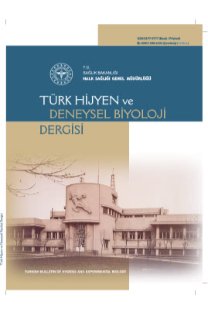Bir Evsel Atıksu Arıtma Tesisinde İşletme Maliyetlerinin İncelenmesi
İşletme maliyetleri, kentsel atıksu arıtma tesisi, atıksu arıtma tesisleri için enerji ihtiyacı
Investigation of Operating Costs at an Urban Wastewater Treatment Plant
___
- 1. Frison N, Chiumenti A, Katsou E, Malamis S, Bolzonella D, Fatone F. Mitigating off-gas emissions in the biological nitrogen removal via nitrite process treating anaerobic effluents. J Clean Prod, 2015; 93:126-33.
- 2. Longo S, d’Antoni BM, Bongards M, Chaparro A, Cronrath A, Fatone F, et al. Monitoring and diagnosis of energy consumption in wastewater treatment plants. a state of the art and proposals for improvement. Appl Energ, 2016; 179:1251-68.
- 3. Hernandez-Sancho F, Molinos-Senante M, & Sala-Garrido R. Cost modelling for wastewater treatment processes. Desalination 2011; 268(1- 3):1-5.
- 4. Brandt MJ, Middleton RA, Wang S. Energy efficiency in the water industry: a compendium of best practices and case studies-global report. London: IWA Publishing, 2012.
- 5. EPA. Energy efficiency in water and wastewater facilities, Local Government Climate and Energy Strategy Guides, EPA-430-R-09-038. Washington DC: United States Environmental Protection Agency, 2013.
- 6. Chae KJ, Kang J. Estimating the energy independence of a municipal wastewater treatment plant incorporating green energy resources. Energ Convers Manage, 2013; 75:664- 72.
- 7. Shizas I, Bagley DM. Experimental determination of energy content of unknown organics in municipal wastewater streams. J Energ Eng, 2004; 130(2):45-53.
- 8. Tchnobanoglous G, Bourton FL, Stensel HD. Wastewater engineering, treatment and reuse. 4th ed. Hongkong: Metcalf & Eddy, Inc. 2003.
- 9. Panepinto D, Fiore S, Zappone M, Genon G, & Meucci L. Evaluation of the energy efficiency of a large wastewater treatment plant in Italy. Appl Energ 2016; 161: 404-11.
- 10. Trapote A, Albaladejo A, Simón P. Energy consumption in an urban wastewater treatment plant: the case of Murcia Region (Spain). Civ Eng Environ Syst, 2014; 31(4):304-10.
- 11. Vera I, Sáez K, Vida G. Performance of 14 fullscale sewage treatment plants: comparison between four aerobic technologies regarding effluent quality, sludge production and energy consumption. Environ Technol, 2013; 34(15):2267- 75.
- 12. Foladori P, Gatti GB, Groff M. Analisi ed efficientamento energetico dell’impianti di depurazione di Folgaria (TN). Atti della 49° Giornata di Studio di Ingegneria Sanitaria Ambientale, Ottobre, 23, Genova. 2013.
- 13. Guglielmi L, Belli R. Riduzione dei consumi energetici nell’impianto di depurazione di Mancasale (RE), Atti della 49° Giornata di Studio di Ingegneria Sanitaria Ambientale, Ottobre, 23, Genova. 2013.
- 14. Frijns J, Hofman J, Nederlof M. The potential of (waste) water as energy carrier. Energy Convers Manag, 2013; 65:357-63.
- ISSN: 0377-9777
- Başlangıç: 1938
- Yayıncı: Türkiye Halk Sağlığı Kurumu
Lutfi Saltuk DEMİR, Saniye Bilge ALTINAY, Sevda MUTLU, Ayşe CAN, Yusuf Kenan BOYRAZ, Mehmet UYAR, Yasemin DURDURAN, Tahir Kemal ŞAHİN
Deprem Sonrası Toplanma Alanlarına İçilebilir Su Dağııtım Problemi
Aslıhan YILDIZ, Ertuğrul AYYILDIZ, Çoşkun ÖZKAN, Alev TAŞKIN GÜMÜŞ
Su yükü, sığınmacılar ve güvenlik
Özlem AKSOY, Cahit Armağan DİLEK, Başak TAŞELİ
Aslı Ayça ÖZYAZGAN TOKAY, Serdar DENİZ, Erkan PEHLİVAN
Çorum ilinde adolesanların günlük içme suyu tüketimi ve bazı beslenme alışkanlıklarıyla ilişkisi
Gülay YILMAZEL, Serpil BOZDOĞAN
Bir Evsel Atıksu Arıtma Tesisinde İşletme Maliyetlerinin İncelenmesi
Sureyya ALTIN, Ahmet ALTIN, Sevcan DOĞRU
Derya ÇAMUR, Fatma Sena KONYALIOĞLU, Gamze KETREZ, İbrahim Sefa GÜNEŞ, Metin HASDE
İçme-Kullanma Sularında Rotavirüs Varlığının EPA 1615 Yöntemi İle Tespitinin Uygulanabilirliği
Özgül SEMİZOĞLU, Zehra İrem ERİS, Fatma Karadeniz DURSUN, Sule Senses ERGUL, Edibe Nurzen Namlı BOZKURT
Meslek Yüksekokulu öğrencilerinde günlük su tüketimi
Ambalajlanmış içmesuyunda LC-MSMS yöntemiyle akrilamid tayini
